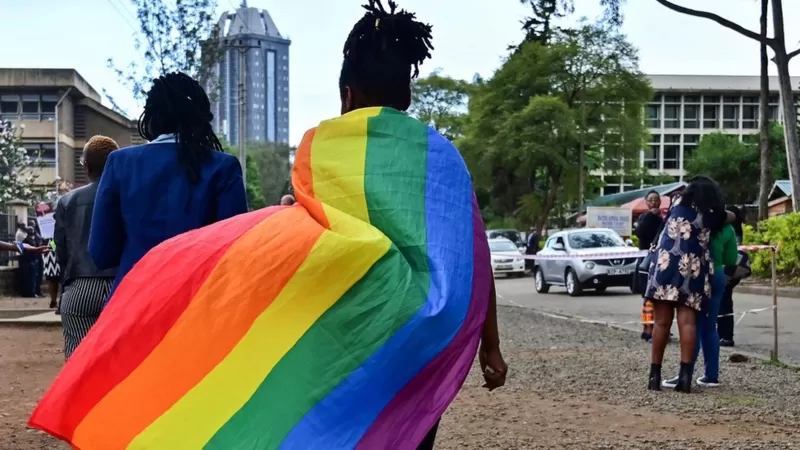l
Kenyan authorities were wrong to ban the gay community from registering a rights organisation, the country’s Supreme Court has ruled.
Yet at the same time it stressed that gay sex remains illegal.
The judges ruled three-to-two that the country’s NGO board was wrong to stop the National Gay and Lesbian Human Rights Commission (NGLHRC) from registering in 2013.
As Kenya’s highest court, the Supreme Court’s ruling cannot be overturned.
In their judgment, the judges ruled that “it would be unconstitutional to limit the right to associate, through denial of registration of an association, purely on the basis of the sexual orientation of the applicants”.
l
Nevertheless, the ruling is bitter-sweet for Kenya’s gay community. Laws which were introduced under British colonial rule mean that it is criminal to have sex that “is against the order of nature”, which can result in up to 14 years in prison.
In May 2019, Kenya’s high court rejected an attempt to overturn these laws.
Friday’s judgement ends a 10-year legal battle which began in 2013 when Eric Gitari, the former executive director of the NGLHRC, challenged the head of Kenya NGO Coordination Board’s refusal to permit him to apply to register an NGO under a name containing the words gay or lesbian.
The judges ruled in his favour at the High Court in 2015, again at the Court of Appeal in 2019 and finally in 2023.
Speaking after the ruling, Njeri Gateru, the current executive director of the NGLHRC, said: “The Supreme Court’s decision to uphold the lower courts’ rulings is a triumph for justice and human rights.
“At a time where the Kenyan LGBTIQ+ community is decrying the increased targeting and violence; this decision affirms the spirit and intention of the Constitution to protect all Kenyans and guarantee their rights.”
The ruling comes at a time when homophobic rhetoric has been rising in Kenya.
Members of the LGBTQI+ community have been harassed by police, subjected to body examinations to “prove” gay sex, and openly insulted on social media and in public spaces. Some say they have even been denied healthcare and thrown out of rental houses for being gay.
On the day of the judgement, Member of Parliament George Peter Kaluma filed an official notice that he intended to introduce a bill which would jail for life people convicted of homosexuality or the promotion of it.
While Friday’s Supreme Court ruling arguably torpedoes any attempts to legally harass openly gay people with new laws, Mr Kaluma can still rally MPs to increase jail terms for gay sex.
It is also illegal to have gay sex in neighbouring Uganda, where Muslim leaders used Friday prayers to preach against homosexuality.
The head of the country’s Muslims, Mufti Sheikh Ramathan Mubajje, called on the authorities to enact even tougher laws against same-sex relations.
He was speaking at the Old Kampala mosque in the capital, Kampala, where hundreds had gathered for Friday prayers.
Earlier in the week, the Uganda Muslim Supreme Council circulated a letter to all clerics under its association gazetting Friday as the day to carry out peaceful protests against homosexuality in Uganda.
The clerics were asked to prepare sermons condemning same-sex relations and extend the same message to the media and schools.
In the event, the protests were only held in the eastern city of Jinja.
Gay rights activist Frank Mugisha described the protests as dangerous, saying they could increase cases of violence against those who identify as LGBT.
There has been a recent surge in homophobic sentiment in the country.
Last week, President Yoweri Museveni said Uganda would not embrace homosexuality and that the West should stop trying to impose its views and “normalise” what he called “deviations”.
